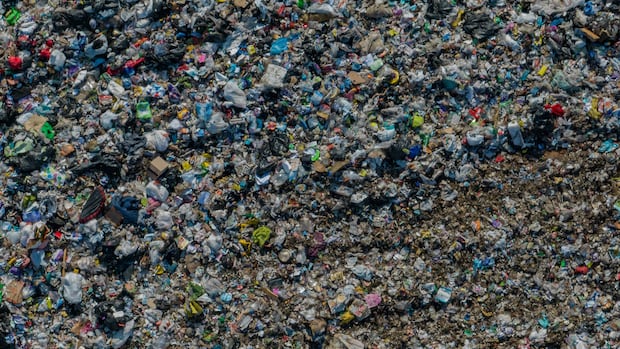OttawaOttawa city councillors have been reassured that the idea of building a waste-to-energy incinerator is still on the table, and they will still have a fulsome discussion about how best to deal with residents’ garbage and recycling in early 2027. Critics say landfill purchase would pre-empt future garbage debateKate Porter · CBC News · Posted: Nov 26, 2025 4:00 AM EST | Last Updated: 2 hours agoListen to this articleEstimated 6 minutesThe audio version of this article is generated by text-to-speech, a technology based on artificial intelligence.Bags of trash and lose items are seen at the City of Ottawa’s Trail Road landfill on Feb. 27, 2024. (Michel Aspirot/CBC)Ottawa city councillors have been reassured that the idea of building a waste-to-energy incinerator is still on the table, and they will still have a fulsome discussion about how best to deal with residents’ garbage and recycling in early 2027.But some say if council votes Wednesday to pursue buying an east end landfill — at a price that hasn’t been made public — they’ll be pre-empting a debate that’s been years in the making.The City of Ottawa is looking to submit a bid in a private process run by BMO Capital Markets on behalf of the Taggart and Miller families, who are selling their 192-hectare landfill site near Highway 417 and Boundary Road.What happened behind the scenes before the city’s pursuit of a landfill site went publicThe owners first approached the mayor’s office about the sale last April through a government relations firm. City staff say an expert team has since done its due diligence, operating under a non-disclosure agreement, and recommends buying the landfill site because it has ministry approvals to accept municipal waste and is a rare opportunity.The public only learned the city was exploring the purchase this month, but councillors had received some information in closed sessions. Before the potential sale of the Taggart-Miller site came along, however, council had fast-tracked a consultant’s report to study five options for reducing waste. It was made public in June, ranking an incinerator and the status quo as the best options, while building a new landfill from scratch was ranked fifth of five. Staff are now analyzing a short list of three options and are due to report to a new council after the 2026 municipal election with a recommendation and business case.The joint venture Taggart Miller Environmental Services Inc. received ministry approval in 2017 for a landfill on Boundary Road near Highway 417 after years of studies and protests. (Felix Desroches/CBC)”That work will proceed,” Alain Gonthier, the city’s general manager of public works, told councillors at a special committee meeting on Nov. 21. “The consideration of acquiring the [landfill] site does not halt or alter that process.”For years, the city has been working on strategies for its solid waste, concerned with the remaining lifespan on its Trail Road landfill. Gonthier updated councillors Friday that the Trail Road landfill has 10 years of capacity left, but an expansion could prolong that by 15 years, and the use of two private landfills by a further six.Mayor Mark Sutcliffe favours acquiring Taggart-Miller’s landfill site, arguing it will eventually operate as a landfill regardless, and the city would have greater control as its owner.Like Gonthier, Sutcliffe said buying the landfill site wouldn’t preclude other options.”If the city does become the owner of this property, we could still, for example, operate an incinerator or another waste energy solution in Ottawa,” he said Friday.Landfill purchase a ‘new variable’Orléans East-Cumberland Coun. Matt Luloff says that debate will lose urgency if the city has gained access to 30 years of capacity by buying a second landfill site.”I think it changes the calculus … by providing a new variable,” he told CBC News. “I don’t know whether or not there is an appetite for taxpayers to be doling out for two solutions when one has already been purchased.”Luloff has long advocated for an incinerator that converts waste to energy, because he sees it as a more modern solution for dealing with garbage than landfills. He also points out the waste-to-energy incinerator was a top option in June.Consultant HDR Corporation found an incineration facility would have the environmental benefit of converting 77 per cent of waste into steam to generate electricity, leaving 23 per cent ash and residue that would require disposal at a landfill. It would also require lengthy approvals and be expensive to build, the consultants noted, with a price tag of between $497 million and $862 million.At the Durham York Energy Centre, steam produced by burning garbage at high temperatures travels through pipes to turbines, where it produces electricity. (Frédéric Pepin/Radio-Canada)An incinerator shared first place with the status quo, according to the consultants’ analysis last June. Continuing to use the Trail Road landfill until it’s full, then using private landfills, would require minimal investment and be easy, but could create greenhouse gases, and the city could be at risk of a private landfill’s tipping fees.Building a landfill from scratch ranked fifth and last. Staff pointed to the odour, public opposition, greenhouse gases, managing leachate and securing approvals. Those approvals are one of the key selling points for the City of Ottawa as it investigates purchasing the Taggart-Miller site. It secured the licence to accept commercial and industrial waste in 2017, and received an amendment to also accept household waste in May 2024. It has yet to begin operations, however, and does not yet have an approved site plan.At the committee meeting Friday, councillors including Glen Gower said the idea of turning a private landfill site into a public one was compelling because it would give the city far more control. Coun. Shawn Menard noted the best option would be for residents to reduce waste in the first place. Coun. Isabelle Skalsi, who was recently elected to represent Osgoode ward where the Taggart-Miller landfill site is located, said the potential purchase might not force the city’s hand, but she offered an analogy. “This is like saying, ‘Let’s decide two years from now about whether or not we buy a cottage,’ and then purchasing waterfront property as a strategic acquisition,” she told colleagues. “Don’t tell me that a cottage doesn’t come next.”This will be a landfill. These are tax dollars. Let’s decide what we want, then buy what we need.”ABOUT THE AUTHORKate Porter does explanatory and analysis pieces about local issues for CBC Ottawa. She covered Ottawa City Hall daily for eight years, doing deep dives into development decisions, covering the LRT public inquiry and analyzing multiple elections and budgets. In her more than 20 years at CBC, she has also read the radio news and covered the arts beat.Follow Kate on Twitter
Wednesday, 4 Mar 2026
Canada – The Illusion
Search
Have an existing account?
Sign In
© 2022 Foxiz News Network. Ruby Design Company. All Rights Reserved.
You May also Like
- More News:
- history
- Standing Bear Network
- John Gonzalez
- ᐊᔭᐦᑊ ayahp — It happened
- Creation
- Beneath the Water
- Olympic gold medal
- Jim Thorpe
- type O blood
- the bringer of life
- Raven
- Wás’agi
- NoiseCat
- 'Sugarcane'
- The rivers still sing
- ᑲᓂᐸᐏᐟ ᒪᐢᑿ
- ᐅᑳᐤ okâw — We remember
- ᐊᓂᓈᐯᐃᐧᐣ aninâpêwin — Truth
- This is what it means to be human.
- Nokoma











